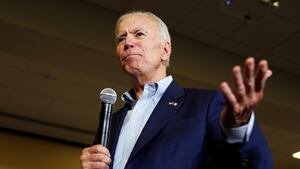Donald Trump told his rapt audience in Orlando Tuesday night that the Democrats “want to destroy you.”
The next day, the Democrats started doing some destroying, all right. But of each other.
It started with Joe Biden’s totally bizarre comments about how they all used to get along with racists in the Senate, which brought a number of well-deserved smackdowns on Wednesday, the best by far from Cory Booker: “You don’t joke about calling black men ‘boys.’ ... Vice President Biden’s relationships with proud segregationists are not the model for how we make America a safer and more inclusive place for black people, and for everyone. I’m disappointed that he hasn’t issued an immediate apology for the pain his words are dredging up for many Americans. He should.”
Then, later the same day, Bernie Sanders’ campaign seized on a Politico report from Charleston, S.C., where the centrist group Third Way was having a conclave, which said that the group was learning to like Elizabeth Warren. “The cat is out of the bag. The corporate wing of the Democratic Party is publicly ‘anybody but Bernie,’” Sanders wrote on Twitter.
Is there any bigger lesson in these dustups? To some extent, yes. They reflect divides within the party that everyone is going to have to take care not to let get out of control lest they help make it easier for Trump to win a second term.
On the Biden-Booker front, on one level this was just another Biden malapropism. He’s made them his whole career, and there was no reason to think he was going to stop making them now.
This one alone probably isn’t a killer. His campaign is already arguing what he meant to say and in the coming days, he’ll apologize, or make a self-deprecating joke, and rehearse the positive parts of his civil rights record and have black supporters come out attest to their conviction that though he may misspeak here and there, they have no doubt his heart is in the right place. And if it really looks like it’s dinging him, he may have to use that Obama lifeline far earlier in the game than planned.
But it also showed how out-of-date his idea of acceptable rhetoric is in today’s Democratic Party. Someone is going to have to sit that guy down and tell him how to communicate in this day and age. And that he should never talk about the past. It only reminds people of his record (the bad parts) and his age. The kind interpretation of his remarks would be that he was trying to say we had horrible sonsabitches back then, too, but somehow we found ways to compromise, but what came across was a long, long way from that.
Booker pounced effectively, which is what you need to do when you’re a second-tier candidate—seize these little openings. He’ll get some press and raise some money out of this. More eyes will be on him at next week’s debates. He will not, however, have a chance to jam Biden in person. Booker is night one, and Biden, night two.
From a distance, the Sanders-Warren flare-up may have looked the same. But the contrast between Booker-Biden and Sanders-Warren is that Booker responded to something that Biden directly did (said), while in the second case, Warren didn’t do anything. Some other folks started talking her up. But Sanders’ people never miss a chance to reinforce the “it’s us vs. the world” narrative. That’s the driving motivation of the Sanders campaign. Their beef in this case isn’t with Warren. It’s with Third Way and the “corporate wing of the Democratic Party.” It was opportune, from Sanders’ perspective, that this happened during a week when everyone is chattering about how Warren is overtaking Sanders in some polls, moving into second place. And here, lo and behold, was a chance to tie Warren to the corporatists!
If one of these two quarrels is going to metastasize into something ugly, it’s pretty easy to see which one. Despite Booker’s tough words today, if Biden wins the contest, Booker will get behind him and campaign vigorously for the Democratic nominee. It would take a lot more than what Biden said for Booker to want to be seen by anyone as having not done his part to stop Trump. Likewise, if somehow Booker catches fire and is the nominee, Biden will back him in a heartbeat.
Sanders-Warren, though, has the potential to get bitter. If Biden pulls two or three more of these verbal gaffes, Democratic insiders are going to start worrying that he just can’t go the distance, and they’ll probably settle on Warren, at least as things stand now, because she has earned it (though it’s way too early to count out Kamala Harris and two or maybe three others).
And if it really is the case that the party starts to close ranks around Warren, how will Sanders and his devoted base react? The bottom line here is the same thing it was in 2016. Sanders is not a Democrat. He hates Trump as much as the rest of them and wants to see Trump lose; no doubt of that. But he has no loyalty to the Democratic Party in the way all the rest of them do. If he loses, he will not act in as predictable a fashion.
It's never been more important for the Democratic Party to win an election. In the history of the country. Never. But these two episodes suggest a couple of fault lines—generational and ideological—on which the party’s divisions could badly damage its chances.








